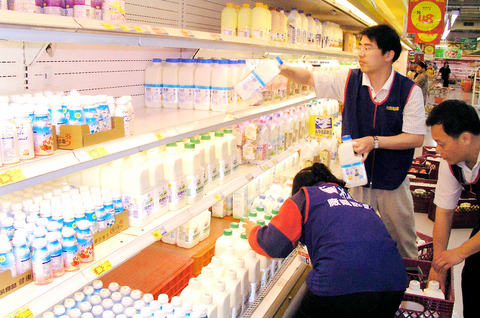Faced with changes in the job market and an aging population, the nation's largest convenience store chain operator is adjusting its franchise system to embrace more middle-aged people to deliver sustainable growth.
President Chain Store Corp (統一超商), which runs 3,839 7-Eleven stores nationwide, said it also encourages retail business owners from other sectors to join its franchise network. Currently, 84 percent of President Chain's 7-Eleven outlets are franchised.
"The quality of the franchisees is the key to successful operation. We'll grant franchisees better benefits compared with competitors to take care of their families, but we also hope every 7-Eleven outlet can make a profit," said Hsu Chung-jen (徐重仁), president of President Chain, at a press conference yesterday.

PHOTO: CHOU MIN-HONG, TAIPEI TIMES
Hsu announced that the company is loosening requirements for franchise applicants, including raising the maximum age from 50 to 55, and offering preferential deals to veterans and their relatives.
The measures are aimed at luring those interested in starting a second career, especially as the privatization of state-run companies will see a rising number of middle-aged retirees, he said.
Taiwan has over 8,000 convenience stores from the five major chain operators, giving it the highest store density in the world.
Fierce competition in the sector and concerns over market saturation have made it more difficult for these stores to expand their operating turf and boost sales.
But Hsu denied speculation that the changes are because the company is facing a bottleneck.
President Chain, founded in 1978, expects to expand its number of 7-Eleven stores to 4,000 by the year's end.
"We just think this is the right direction, in line with social changes and a good way to absorb experienced franchisees," he said.
By offering more incentives, the company guarantees franchisees that they would enjoy the highest net profits in the convenience store sector, at NT$2.4 million a year. Those opting to transform their original business -- be it a bookstore, a noodle shop or a clothes shop -- into a 7-Eleven outlet will enjoy a discount of NT$900,000 off the usual average cost of NT$2 million, said Chang Kuo-kwang (張國光), the company's manager for real estate development.
To encourage sustainable development, franchisees renewing contracts will garner higher net profits and pay reduced franchise fees, Chang said.
Monica Chiu (
"This competitive sector needs mature operators to help stabilize business, but those at a younger age are generally not willing to persist with hard work," she said.
In addition, the initial capital requirement of NT$2 million to open a new store is difficult for younger people to meet.

Taiwan Semiconductor Manufacturing Co (TSMC, 台積電) halted shipments to a customer this month after its semiconductors were sent to China’s Huawei Technologies Co (華為), potentially breaching US sanctions, a government official said. The US slapped sanctions on Huawei in 2019, and expanded them the following year, over fears its technology could be used for Beijing’s espionage operations. The restrictions prevent TSMC from selling semiconductors to Huawei. However, TSMC discovered on Oct. 11 that chips made for a “specific customer” had ended up with the Chinese company, a Taiwanese official with knowledge of the incident said on the condition of anonymity. TSMC “immediately activated

US SANCTIONS: The Taiwan tech giant has ended all shipments to China-based Sophgo Technologies after one of their chips was discovered in a Huawei phone Taiwan Semiconductor Manufacturing Co (TSMC, 台積電) suspended shipments to China-based chip designer Sophgo Technologies Ltd (算能科技) after a chip it made was found on a Huawei Technologies Co (華為) artificial intelligence (AI) processor, according to two people familiar with the matter. Sophgo had ordered chips from TSMC that matched the one found on Huawei’s Ascend 910B, the people said. Huawei is restricted from buying the technology to protect US national security. Reuters could not determine how the chip ended up on the Huawei product. Sophgo said in a statement on its Web site yesterday that it was in compliance with all laws

TECH TITANS: Nvidia briefly overtook Apple again on Friday after becoming the world’s largest company for a short period in June, as Microsoft fell to third place Nvidia Corp dethroned Apple Inc as the world’s most valuable company on Friday following a record-setting rally in the stock, powered by insatiable demand for its specialized artificial intelligence (AI) chips. Nvidia’s stock market value briefly touched US$3.53 trillion, slightly above Apple’s US$3.52 trillion, London Stock Exchange Group data showed. Nvidia ended the day up 0.8 percent, with a market value of US$3.47 trillion, while Apple’s shares rose 0.4 percent, valuing the iPhone maker at US$3.52 trillion. In June, Nvidia briefly became the world’s most valuable company before it was overtaken by Microsoft Corp and Apple. The tech trio’s market capitalizations have been

Shares of Starlux Airlines Co (星宇航空) surged more than 53 percent on its debut on the Taiwan stock exchange yesterday. Starlux shares closed up 53.75 percent at NT$30.75 from its initial public offering price of NT$20 after retreating in late trading from a 60 percent rise. China Airlines Ltd (CAL, 中華航空) rose 0.90 percent to close at NT$22.35, while EVA Airways Corp (長榮航空) gained 0.40 percent to close at NT$37.70. In Taiwan, a newly listed stock is allowed to go beyond the 10 percent maximum increase or decline in its first five trading sessions. At the listing ceremony, Starlux chairman Chang Kuo-wei (張國煒) said